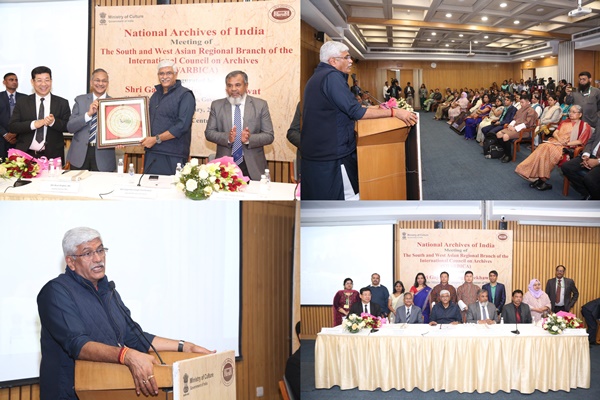SWARBICA Executive Body Meeting 2025

- 23 Feb 2025
In News:
- The Executive Body Meeting of the South and West Asian Regional Branch of the International Council on Archives (SWARBICA) was held on 20–21 February 2025 at the India International Centre, New Delhi.
- It was inaugurated by Union Minister for Culture and Tourism, Gajendra Singh Shekhawat, and hosted by the National Archives of India.
- This is the second time India has hosted the SWARBICA meeting, the last being in Colombo, Sri Lanka, in 2017.
Key Highlights
- The event marked the first SWARBICA Executive Meeting in eight years.
- Participating nations included Nepal, Bhutan, Bangladesh, and Sri Lanka.
- Pakistan joined the meeting virtually, while Iran could not attend due to visa-related issues.
- The meeting provided a platform for regional cooperation in archival development, emphasizing shared cultural and religious heritage.
Agenda and Focus Areas
- Digital Preservation & Archives Digitization:
- Arun Singhal, Director General of the National Archives of India (NAI) and Treasurer of SWARBICA, presented NAI’s ongoing efforts in the digitization of archival records.
- Emphasis was placed on training programs, technical exchange, and conservation practices.
- AI in Digital Archiving:
- Aseminar titled "Using AI for Digital Preservation in Archives" was organized.
- Experts from India, Bangladesh, Nepal, Sri Lanka, and SAMHiTA (India International Centre) discussed the potential of artificial intelligence in archival science.
About SWARBICA
- It functions as a regional arm of the International Council on Archives (ICA), fostering collaboration among archival institutions in South and West Asia.
- Established: The idea was proposed in 1973 at an ICA meeting in Brussels and officially launched on 11th December 1976 at Vigyan Bhawan, New Delhi.
- SWARBICA promotes professional networking, training, resource sharing, and advancement in archival practices among member countries.
Significance for India
- Reflects India’s leadership in regional cultural cooperation.
- Aligns with national goals of digital governance, knowledge preservation, and heritage conservation.
- Strengthens India's cultural diplomacy in South and West Asia.
